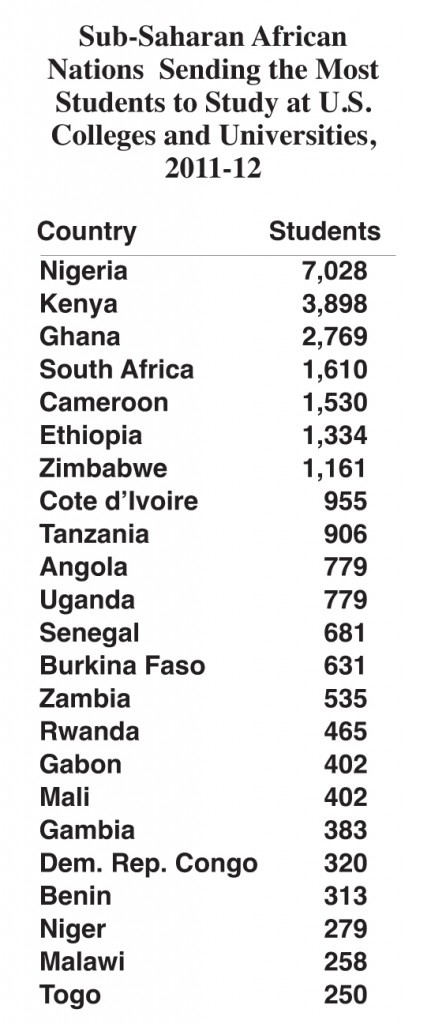 From 1992 to 2001 there was a steady increase in the number of foreign students at U.S. colleges and universities. During this period the number of African students at U.S. colleges and universities doubled.
From 1992 to 2001 there was a steady increase in the number of foreign students at U.S. colleges and universities. During this period the number of African students at U.S. colleges and universities doubled.
 But after the September 11, 2001 terrorist attacks, it became more difficult to obtain a visa to study in the United States. In the 2002-03 academic year there were 40,193 students from Africa at American colleges and universities. Two years later enrollments of students from Africa had dropped by more than 10 percent to 36,100.
But after the September 11, 2001 terrorist attacks, it became more difficult to obtain a visa to study in the United States. In the 2002-03 academic year there were 40,193 students from Africa at American colleges and universities. Two years later enrollments of students from Africa had dropped by more than 10 percent to 36,100.
Since that time the number of African students at U.S. colleges and universities has fluctuated only slightly. In the 2011-12 academic year, data compiled by the Institute on International Education shows there were 35,502 Africans studying in the United States. This was down 3.8 percent from the previous year. In contrast, the number of foreign students in the U.S. from all regions of the globe was up 5.7 percent. So, as a result, the percentage of all foreign students in the U.S. who are from Africa has declined. According to the latest data, in the 2011-12 academic year students from Africa made up 4.6 percent of all foreign students in the U.S., down from 5.1 percent last year and 6.1 percent five years ago.
It is important to note that many African students studying in the U.S. are not Black. A large contingent of African students come from the Arab nations of North Africa. In the 2011-12 academic year, Egypt sent more than 2,200 students to U.S. colleges and universities. In addition, there are no reliable statistics on how many of the 1,610 students from South Africa are White. But overall, we can make a reasonable estimate that at least 25,000 Black Africans are currently studying at colleges and universities in the United States.
Among sub-Saharan African nations, Nigeria in 2011-12 sent the most students to American colleges and universities. That year there were 7,028 Nigerians studying here. Nigerian enrollments have tripled since 1995.
In 2010-11 Kenya ranked second, sending 3,898 students to the United States. But enrollments from Kenya have declined in recent years, including a 16 percent drop this year alone. Ghana ranked third with 2,769 students at U.S. colleges and universities.
Zimbabwe, South Africa, Cameroon, and Ethiopia each had more than 1,000 students studying in this nation. Cote d’Ivoire, Tanzania, Angola, Uganda, Senegal, Burkina , and Zambia all sent at least 500 students to study at U.S. colleges and universities.
All told, 50 nations from sub-Saharan Africa had college students studying in the U.S. during the 2011-12 academic year.











There is an interesting phenomenon that has developed for South Africans over the same period under examination. Most are brought to the US by private labor recruitment companies as au pairs or golf caddies. They don’t come to the US to study, but on temporary visas for low-paying jobs of service to wealthy and upper middle class American families and private golf clubs. Most stay in motels in subpar conditions and never make their way to even earn a GED. New Jersey has hundreds of young women and men caught up in very frustrating dead-end situations.